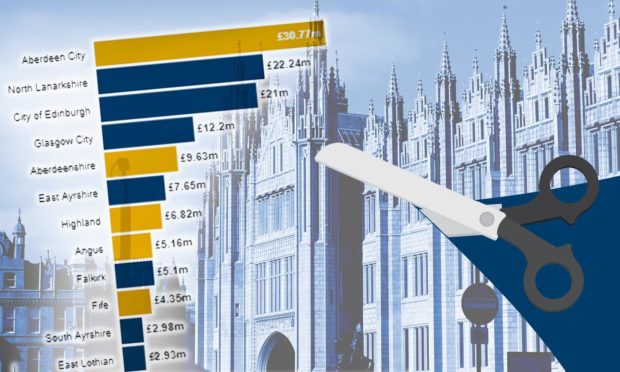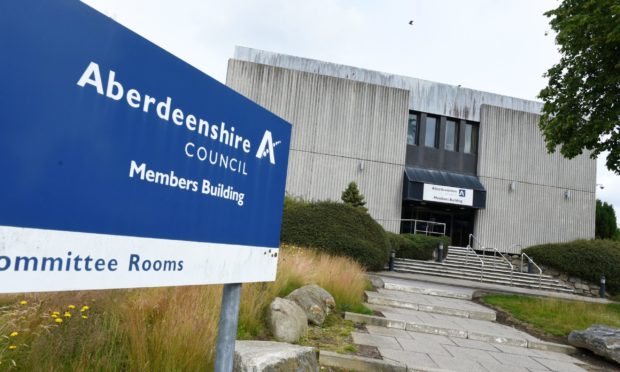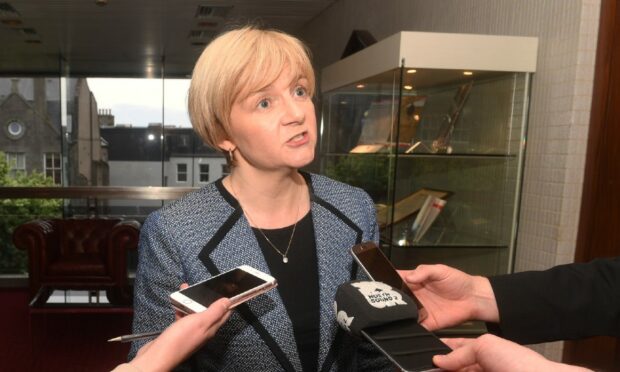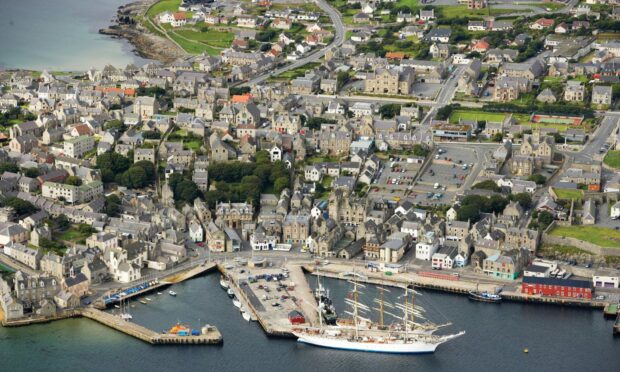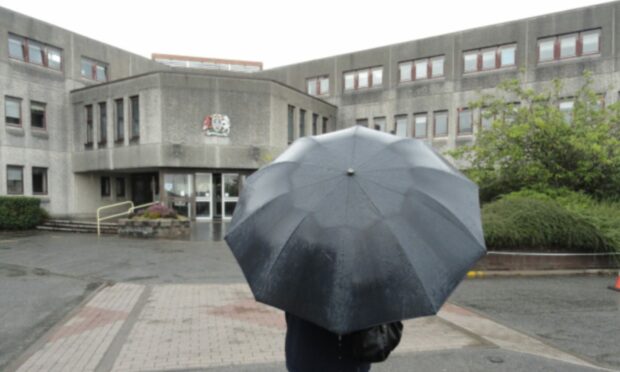Aberdeen City Council is cutting millions of pounds more from spending on services during the pandemic than other local authorities in Scotland.
The scale of the savings measures under way in the Granite City dwarfed most other councils featured in a new analysis of local government finance by the BBC’s Shared Data Unit.
Cuts at Aberdeenshire Council, Angus Council and Western Isles Council were also highlighted as being in the top five of some categories in Scotland.
And Shetland Islands Council stood out for proportionally facing the largest two-year funding shortfall in the UK, and for planning to use a larger proportion of its reserves to balance the books than any other local authority in the country.
Across the UK, the study found that local authorities were making at least £1.7 billion worth of savings in 2021/22, while also using more than £500 million worth of reserves.
Despite those cuts, the councils were still predicting a £3bn budget shortfall by 2022/23.
The £30.7m of savings planned by Aberdeen City Council this year was found to be the highest of the 23 authorities in Scotland who responded to the BBC.
It was followed by £22.2m of cuts at North Lanarkshire, £21m at Edinburgh City, £12.2m at Glasgow City and £9.6m at Aberdeenshire, according to the analysis.
Highland Council was making £6.8m of budget savings, Angus was planning £5.1m, Fife was axing £4.3m, on the Western Isles it was £2.3m, in Dundee City it was £1.3m, and on Orkney Islands it was £574,000.
Aberdeen City Council was also top of the table when it came to “savings as a proportion of net budget”, at 6.4%, and “savings per person in the council area”, at £134.55.
Western Isles Council and Angus Council also made the top five in both of those savings categories, among the authorities which responded.
We are in a position where some councils are struggling to continue to deliver just the statutory services.”
Arianna Giovannini, deputy director of the Local Governance Research Centre and an associate professor in local politics and public policy at De Montfort University in Leicester, said many councils had struggled during the pandemic despite extra funding, with some in England now “at risk of going bankrupt”.
She said: “While support has been given it comes on top of 10 years’ of austerity and it has not been enough to make councils sustainable both in the short and long term.
“The pandemic has forced councils to think the unthinkable. We are in a position where some councils are struggling to continue to deliver just the statutory services.”
Aberdeen City Council has long complained of being one of the lowest funded in Scotland, and has shrunk its workforce by more than a fifth in two decades following annual rounds of spending cuts.
This included paying off 555 workers in just three years between 2017/18 to 2019/20.
Aberdeen City Council leader Jenny Laing said: “I think because we’ve worked very hard on our financial management, we’ve been able to deal with the savings issues, but there’s no getting away from the fact that the impact from Covid on our finances has been significant, particularly because of our reliance on income we raise locally.
“We realised we needed to look at how we change our organisation, our target operating model – investment in digital over the last few years has helped to mitigate some of the issues that Covid has brought – but we can’t get away from the fact that local government has been chronically underfunded over the last 10 or 15 years, and as a result of that all local authorities are struggling to balance the books.
“Aberdeen is no different in that, but I think because we’ve been prudent, we’ve been robust in our financial management, we’re in a better place than some maybe.”
We can’t get away from the fact that local government has been chronically underfunded over the last 10 or 15 years, and as a result of that all local authorities are struggling to balance the books.”
The BBC analysis found 18 out of the 23 Scottish councils planned to make savings in 2021/22, worth a combined £141.6m, and they were also planning to use £94.5m worth of reserves.
The 23 authorities, meanwhile, predicted a combined two-year shortfall of £472.5m by 2023/24, including a gap of £65m at Aberdeen City, £54.9 at Shetland Islands, £37.5m at Aberdeenshire, £19.2m at Angus, £38.4m at Fife and £20.3m at Highland.
The figure for Shetland was highlighted as being “almost half its net spend for 2021/22”, which would be the largest two-year shortfall in the UK proportionally, while its planned use of £29.4m in reserves would amounts to nearly 25% of its net budget, and also be the highest level in the country.
Across Scotland, meanwhile, it was noted that councils received £259m worth of funding to deal with extra Covid-19 expenditure, they also shared a £90m sum to freeze council tax, which all have rubber-stamped.
Maggie Sandison, chief executive of Shetland Islands Council, said the authority was “fortunate” compared to many others in that it holds a “healthy level of reserves”.
“We are confident that we can withdraw circa £14m each year without eroding the underlying investment base in a way that would affect future investment returns,” she said.
“Shetland Islands Council does however need to limit how much we withdraw so that we protect and maintain the buying power of our underlying investments, so they continue to generate returns for years and decades to come.”
She added: “The management of rising costs, reductions in anticipated government funding, reduced commercial income and stopping this unsustainable draw on reserves creates the budget shortfall.
“We are responding to that challenge through a combination of savings, efficiencies and investment in early intervention and prevention to change the future demand profile and costs of services in future years.”
A spokesman for Comhairle nan Eilean Siar (Western Isles Council) said: “Even before the Covid pandemic the Comhairle, like all local authorities, faced challenging financial circumstances and had to look at ways of increasing efficiencies.
“The savings are as a result of more efficient delivery of services and we recognise the key contribution from our officers in responding to that drive.
“Whilst there has been a degree of success the work goes on and the Comhairle is committed to prudent financial management whilst continuing to provide high quality services for our communities.”
An Aberdeenshire Council spokesman said: “The gap in our budget in the middle of the last financial year was significant, and with considerable responsible financial management across services, that gap was partially closed.
“The revenue budget set back in March this year continues to ensure that the council’s financial position is sustainable and capable of meeting the challenges that lie ahead.”
The revenue budget set back in March this year continues to ensure that the council’s financial position is sustainable and capable of meeting the challenges that lie ahead.”
An Angus Council spokeswoman said: “In response to budget pressures over a number of years, the council has developed a change programme which has been utilised to improve efficiencies, drive innovation and support investment in change across all council service areas.
“This has successfully delivered savings over a period of time which has supported the council in balancing its budget.”
A Scottish Government spokesman said: “Despite the pandemic exerting unprecedented pressures on our budget, the 2021/22 local government finance settlement of £11.7bn includes an additional £375.6m for day-to-day revenue spending.
“In addition, the value of our overall Covid-19 support package for councils now totals more than £1.5bn.
“The funding settlement not only gives local authorities the resources but also additional fiscal flexibility, within the powers available to the Scottish Government, to respond to the challenges that the pandemic has created.
“However, our ability to go further in supporting the recovery is limited and our calls to the UK Government for additional fiscal powers have so far gone unheeded.”
